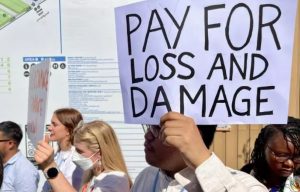Displaced people need a seat at climate change table
Refugees and displaced persons should have a full voice at the next global meeting on climate change, the United Nations refugee agency says.
As the COP27 meeting in Egypt wrapped up, the UNHCR’s special advisor on climate action Andrew Harper sounded the alarm on behalf of refugees and displaced people for whom the climate emergency is piling crisis upon crisis.
For the first time, the voices of refugees and displaced people from the climate frontlines were heard in climate change conference.
Displaced people from Sudan, Yemen, Niger, and elsewhere spoke about how their attempts to adapt to their changing environment are being outpaced by the speed of climate change.
“While I am proud that UNHCR and our partners worked alongside displaced people to ensure they were seen and heard at COP27, we must go further,” Mr Harper said.
“UNHCR is calling for inclusion of refugees and displaced people in the COP27 outcome document.
“Refugees and displaced people are among those most exposed to the climate crisis, many are seeking safety in countries that have done the least to contribute to climate change and yet have the least resources to adapt.
“Displaced people also expect seats at COP28 negotiation tables to ensure decisions are not taken for them, without them.
“We must see dedicated support and scaled-up financing for the countries on the frontlines of the climate emergency, as it is often these same countries that have provided protection to refugees for decades,” Mr Harper said.
 The UNHCR said world leaders have a responsibility to ensure that climate action finance not only reaches climate-vulnerable countries but also displaced people and their host communities.
The UNHCR said world leaders have a responsibility to ensure that climate action finance not only reaches climate-vulnerable countries but also displaced people and their host communities.
“With over 70 per cent of the world’s displaced people coming from the most climate-vulnerable countries, we must see explicit recognition of refugees and displaced people in the COP27 outcome document.” Mr Harper said.
During the conference, climate-impacted countries demanded funding from other states with historically higher carbon emissions to help them prepare for and recover from climate-driven disasters.
The summit officially approved a deal on a fund for developing countries vulnerable to climate change.
After tense negotiations that ran through the night, the Egyptian COP27 presidency released a text of the draft agreement — and simultaneously called a plenary session to gavel it through as a final, overarching agreement.
The session approved the text’s provision to set up a “loss and damage” fund to help developing countries bear the immediate costs of climate-fuelled events such as storms and floods.
Loss and damage is essentially the tally of climate destruction that happens when all else has failed – including mitigation (reducing emissions) and adaptation (reducing risks), where most official climate finance is concentrated.
Vulnerable countries say climate-fuelled disasters have erased billions of dollars in economic wealth, on top of incalculable societal and cultural losses.
Mr Harper said there inevitably be limits to adaptation on climate change, and the world must prepare for loss and damage, such as displacement.
“The cries of displaced people and their host communities and countries will only get louder, which is why loss and damage must become a standard COP agenda item,” he said.
“From the perspective of the refugees and displaced people on the climate frontlines, there is no greater example of loss and damage than of having to flee your home and cross a border to seek refuge,” Mr Harper said.
Observers and climate experts have expressed disappointment at the lack of hard pledges in the final COP27 document.
A raft of new reports underscore how much work remains. Atmospheric levels of greenhouse gases are at record highs. Current pledges to limit emissions could see global temperatures rise by 2.5 degrees Celsius, well above the 1.5 degrees climate experts say is crucial.
A UN report warned there was no credible pathway to 1.5 degrees under current plans, and a separate assessment found that adaptation costs – the price tag for societies to prepare for and lessen the risks of a warmer world – are up to ten times more than what is in the existing finance pipeline.












